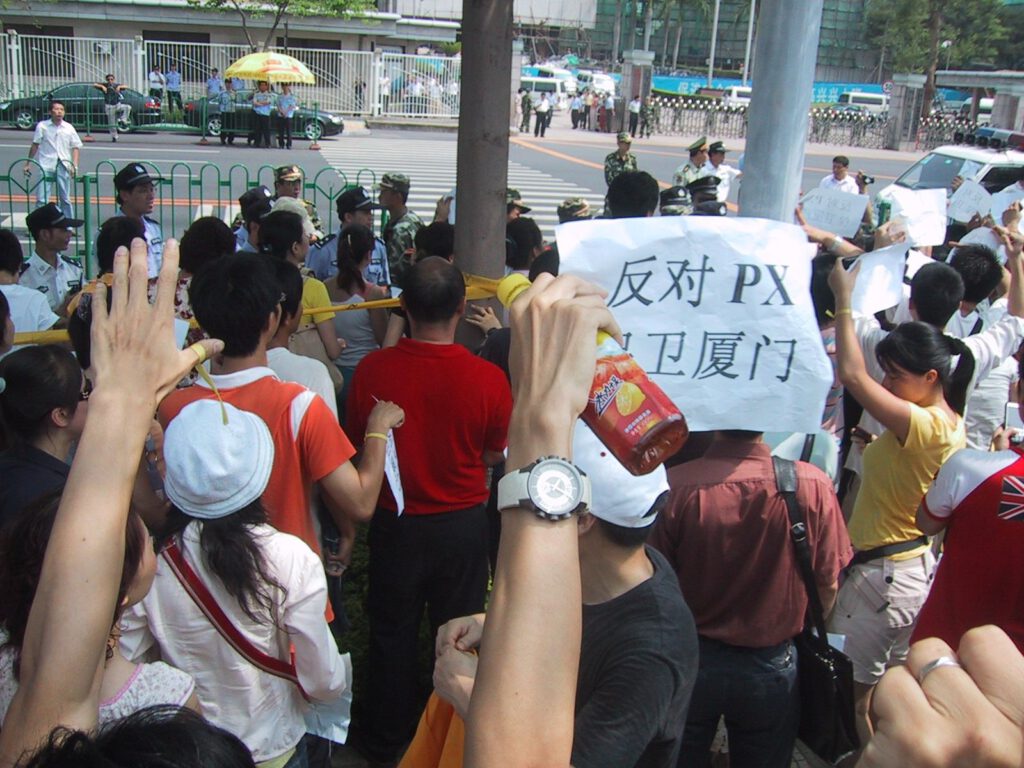ZHANG Hubiao, Associate Professor, Sociology Department of Hohai University, China
In recent years, a series of PX (paraxylene) events have occurred in China. Public concern in China over PX first started with the mass protests in the city of Xiamen in Fujian province, over a planned paraxylene plant. The basic logic of their process is as follows: first of all, PX projects were rapidly promoted by local government; secondly, along with the gradually increasing public awareness of safeguarding basic rights and environmental protection, people started to express their demands by “taking a stroll on the street”; lastly, the PX projects were suspended with local government’s concession.
Different perspectives of risk cognition lead to different attitudes towards PX project. Consequently, environmental risks easily become social stability risks.
Surrounding PX events, various stakeholders, especially the local government and the public, have different views on a few sensitive issues, such as the identification of pollutants and toxicity, and environmental risks brought about by the PX project, and the distance between petrochemical enterprise and residential area. Generally, local government considers environmental risks from the perspective of a quick development of a PX project. However some public intellectuals have concerns about environmental protection. On the one hand, they put emphasis on quoting information from the media and on the other hand, they also question the general public knowledge. The public often understands environmental risk based on their daily experience, yet their cognition is sometimes affected by rumor and hearsay. The discourse from scientists and experts as the third party, are often absent. Moreover, the objectivity of science and technology experts is also relative. Different perspectives of risk cognition lead to different attitudes towards PX project. Consequently, environmental risks easily become social stability risks.
Social theorists argue that in the pursuit of knowledge, a transformation from “certainty” to “uncertainty” has been happening. Certainty of knowledge is one that has clear cause and effect; and uncertainty of knowledge means that scientific knowledge is situated in a certain context and be tested and negotiated to be applied under the specific circumstance. The uncertainty knowledge also means a new type of social relationship among the public, the scientific world and the government, and it has a close relationship with the social construction theory. It holds that all knowledge, including scientific theory, is formed through the participation and function of society, politics, culture and other elements. In other words, scientific knowledge has a close relationship with various stakeholders and their interests, and it is also affected by social opinion.
Behind the differences of knowledge lies competition of interests. Haicang Development Zone where the Xiamen PX project was originally planned to locate has experienced a change from being an area for chemical industry to real estate development, and then back to chemical industry. During the PX project planning period, Xiamen city government’s main consideration is GDP (Gross Domestic Product), namely the project will bring 80 billion yuan GDP every year to the city, but not the petrochemical plant’s impact upon the new residential area. On the contrary, residents generally think that the PX project construction will lead to the devaluation of real estate. In the Ningbo PX event, the environmental problem is also only a fuse, the key issue behind is local villagers’ hope to get compensation for demolition and more material benefits through the implementation of the PX project. This type of dispute is mainly a struggle between the “GDP” and “public opinion”.
Under China’s current political system, from project planning to approval, PX projects are subject to the intervention of government administration mechanisms, which often results in a lack of legitimacy according to law.
Knowledge is the result of negotiation among different stake holders. Under China’s current political system, from project planning to approval, PX projects are subject to the intervention of government administration mechanisms, which often results in a lack of legitimacy according to law. The procedure of a PX project generally includes two major steps: firstly, experts guided by enterprise, design the plan behind closed doors. Secondly, the project plan passes relevant government departments approval, and suddenly emerges with strong support of the local government in front of the public. Public concern is not included in the agenda of the experts and the government during the approval stage, and public participation is only a mere show case. Due to the lack of public participation, there is no consensus on scientific knowledge from different stake holders.
Some people who oppose the PX project are not only opposing the PX project; instead, they are using the occasion to vent their distrust and dissatisfaction towards the society and the government.
Knowledge is also influenced by social opinion or social attitude. During social transition, while social contradictions increase, PX events thus easily become a channel for the public to express their dissatisfaction and grievances. Some people who oppose the PX project are not only opposing the PX project; instead, they are using the occasion to vent their distrust and dissatisfaction towards the society and the government. In this sense, the opposition to the PX project becomes a reflection or catalyst of wider social problems.
Image credit: Zola(周曙光), via Wikimedia Commons. Xiamen Anti-PX Parade.
